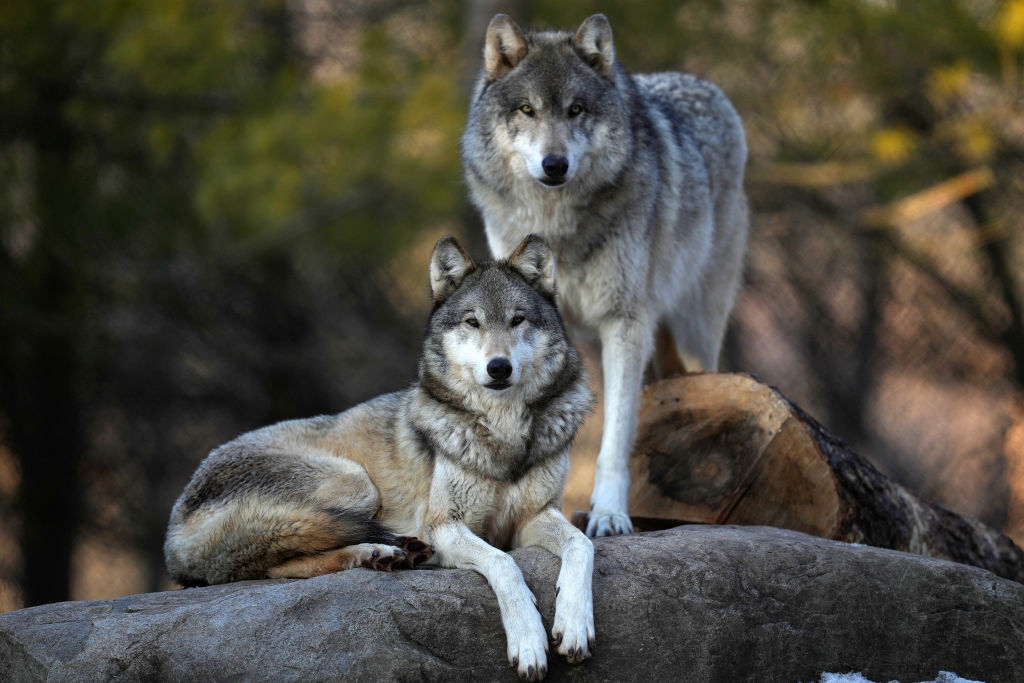'Rewilding' animals could help combat climate change, study finds


A free daily email with the biggest news stories of the day – and the best features from TheWeek.com
You are now subscribed
Your newsletter sign-up was successful
Restoring certain wildlife populations could aid in mitigating climate change, a new study has found. Specifically, the report highlighted how large animals like elephants, whales, bison, and sharks are as effective as forests at capturing carbon, writes the New Scientist.
"There's been skepticism in the scientific community that animals matter, because if you just do the accounting, they'd say animals don't make up much of the carbon on the planet, so they can't be important," said Oswald Schmitz, lead author of the study. But the findings show that maintaining the populations of reef sharks, gray wolves, wildebeest, sea otters, musk oxen, and ocean fish, along with growing the populations of African forest elephants, American bison, and baleen whales, could capture 6.41 gigatons of carbon per year.
"Wildlife species, throughout their interaction with the environment, are the missing link between biodiversity and climate," Schmitz said. The United Nations has warned against average global temperatures rising 1.5 degrees Celsius above pre-industrial levels, which could lead to widespread ecological problems. The study found that current methods for combating climate change, including renewable energy and habitat maintenance, are alone "insufficient" in keeping the world from passing the 1.5-degree threshold. "This interaction means rewilding can be among the best nature-based climate solutions available to humankind," Schmitz continued.
The Week
Escape your echo chamber. Get the facts behind the news, plus analysis from multiple perspectives.

Sign up for The Week's Free Newsletters
From our morning news briefing to a weekly Good News Newsletter, get the best of The Week delivered directly to your inbox.
From our morning news briefing to a weekly Good News Newsletter, get the best of The Week delivered directly to your inbox.
On the other hand, some experts have argued that the study's findings may obscure the larger picture. "I think there is real potential for synergies between wildlife conservation and carbon storage, [but] I am wary of anything like this being touted as a 'global warming game changer,'" commented the University of Oxford's Yadvinder Malhi. "The science is not yet robust enough."
"Trying to get this into international climate frameworks could even be a distraction from the only real global warming game changer," he went on, "which is keeping fossil fuels in the ground."
A free daily email with the biggest news stories of the day – and the best features from TheWeek.com
Devika Rao has worked as a staff writer at The Week since 2022, covering science, the environment, climate and business. She previously worked as a policy associate for a nonprofit organization advocating for environmental action from a business perspective.
-
 ‘Those rights don’t exist to protect criminals’
‘Those rights don’t exist to protect criminals’Instant Opinion Opinion, comment and editorials of the day
-
 Key Bangladesh election returns old guard to power
Key Bangladesh election returns old guard to powerSpeed Read The Bangladesh Nationalist Party claimed a decisive victory
-
 Judge blocks Hegseth from punishing Kelly over video
Judge blocks Hegseth from punishing Kelly over videoSpeed Read Defense Secretary Pete Hegseth pushed for the senator to be demoted over a video in which he reminds military officials they should refuse illegal orders
-
 Russia’s ‘cyborg’ spy pigeons
Russia’s ‘cyborg’ spy pigeonsUnder the Radar Moscow neurotech company with Kremlin-linked funding claims to implant neural chips in birds’ brains to control their flight, and create ‘bio-drones’
-
 How roadkill is a surprising boon to scientific research
How roadkill is a surprising boon to scientific researchUnder the radar We can learn from animals without trapping and capturing them
-
 The ocean is getting more acidic — and harming sharks’ teeth
The ocean is getting more acidic — and harming sharks’ teethUnder the Radar ‘There is a corrosion effect on sharks’ teeth,’ the study’s author said
-
 Cows can use tools, scientists report
Cows can use tools, scientists reportSpeed Read The discovery builds on Jane Goodall’s research from the 1960s
-
 How climate change is affecting Christmas
How climate change is affecting ChristmasThe Explainer There may be a slim chance of future white Christmases
-
 Blue Origin launches Mars probes in NASA debut
Blue Origin launches Mars probes in NASA debutSpeed Read The New Glenn rocket is carrying small twin spacecraft toward Mars as part of NASA’s Escapade mission
-
 Why scientists are attempting nuclear fusion
Why scientists are attempting nuclear fusionThe Explainer Harnessing the reaction that powers the stars could offer a potentially unlimited source of carbon-free energy, and the race is hotting up
-
 Dinosaurs were thriving before asteroid, study finds
Dinosaurs were thriving before asteroid, study findsSpeed Read The dinosaurs would not have gone extinct if not for the asteroid
